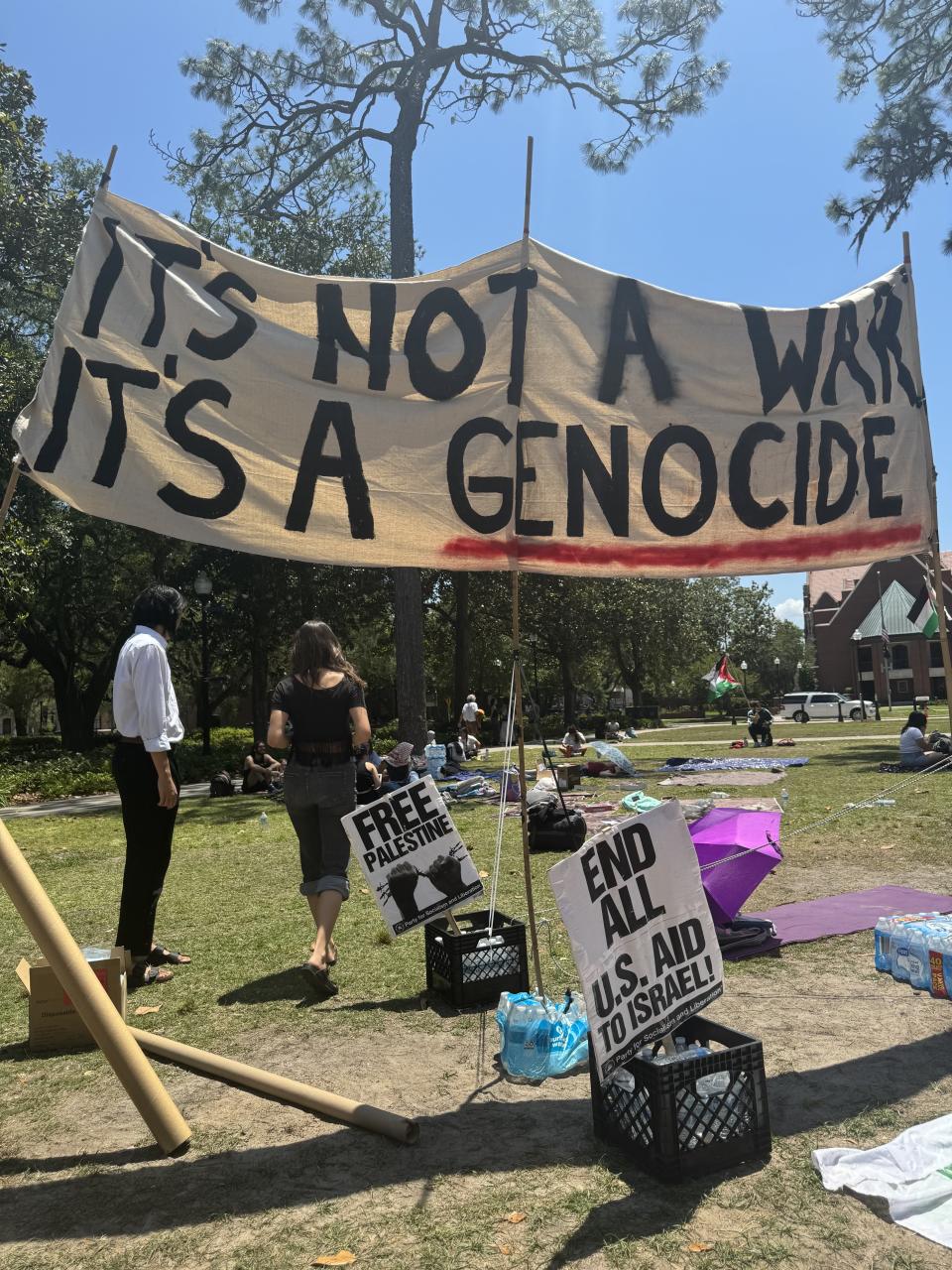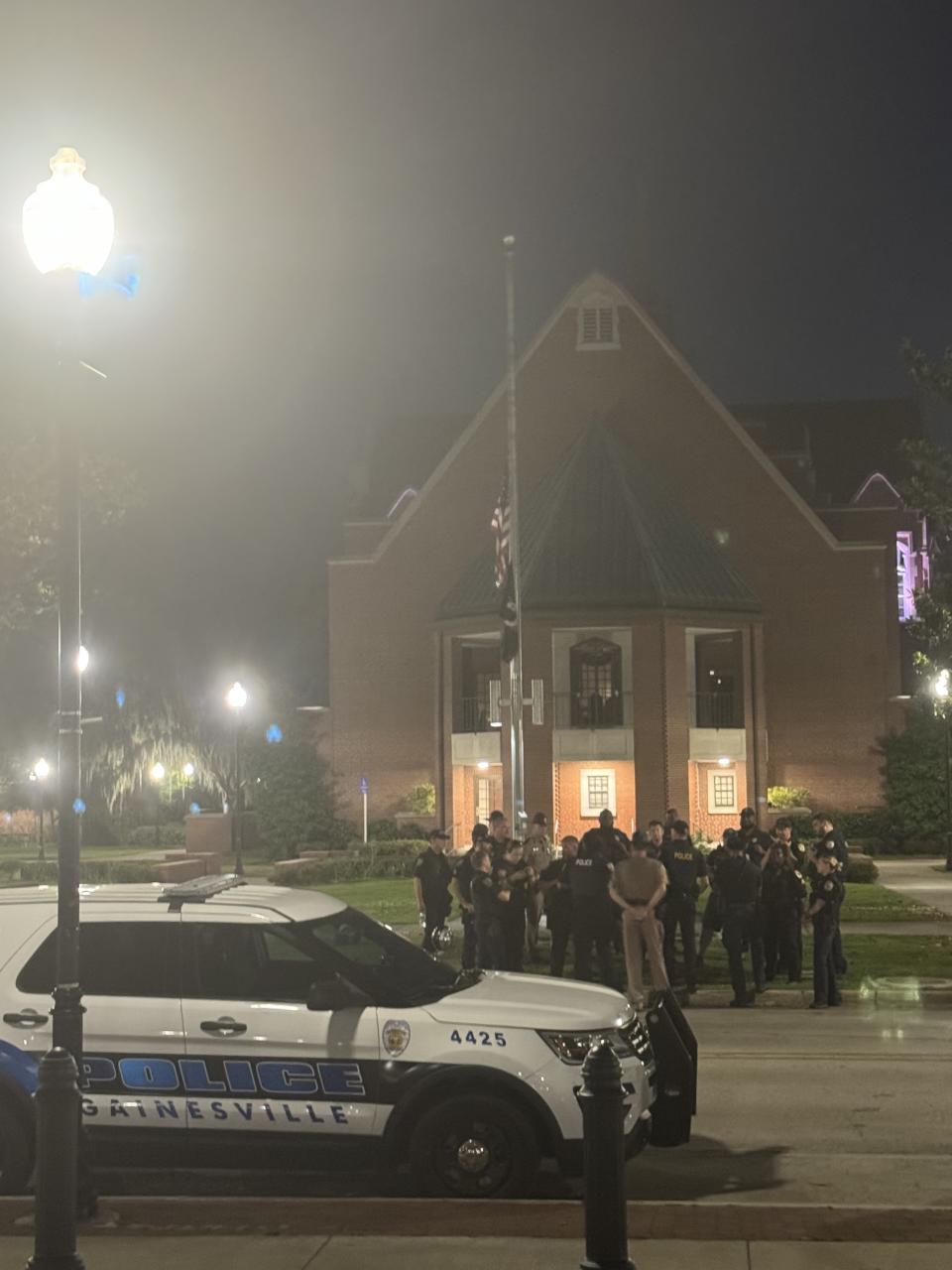University of Florida Says It's ‘Not a Daycare’ After Arrests

Students gather for an encampment at the University of Florida in April 2024. Credit - Cameron Driggers
The University of Florida declared that it is “not a daycare,” in response to the arrests of anti-genocide campus protestors. Nine people, seven of which were students, were arrested Monday evening by the University of Florida Police Department and Florida Highway Patrol after students set up their encampment at the university’s plaza, last Wednesday, in an act of solidarity with Gazans and other student demonstrators across the U.S.
Charges against students varied from failure to obey a lawful command, resisting without violence, to trespassing after warning. One student was also charged with battery on a law enforcement officer after allegedly spitting on one. The Plaza of the Americas has a history of being used as a site of demonstrations and rallies that date back to the fight against segregation in the ‘70s. It has since been used to bring attention tofor other social justice issues, many times over, and functions as a “free speech zone,” per the university’s library site.
“For many days, we have patiently told protesters — many of whom are outside agitators — that they were able to exercise their right to free speech and free assembly,” said Steve Orlando, a spokesperson for the University of Florida, in a statement. “For days UPD patiently and consistently reiterated the rules. Today, individuals who refused to comply were arrested after UPD gave multiple warnings and multiple opportunities to comply.”

The university’s Division of Student Life shared a list of prohibited items and activities, which includes: no sleeping, no amplified sound, no unmanned signs, no building structures—meaning chairs, tables, benches, etc. are not allowed—, no camping, no pillow, no tents, no sleeping bags, etc., according to a flier shared with TIME. Failure to abide by these stipulations could lead to a three-year trespass warning, meaning they are not allowed on University of Florida properties, and suspension from the school. Employees could face termination.
“The arrests that happened yesterday [Monday] underscore how our organizing has become a political point for our governor and other elected officials to make an example out of our students who have the audacity to call for a permanent ceasefire,” Cameron Driggers, a freshman student organizer with the University of Florida Divest Coalition, tells TIME. “It's just increasingly egregious that such a [tame] and peaceful protest has been treated this way.”
Driggers says that interactions with police reached a high tension point on Monday, but adds that students have been confused by the ever-changing rules made by officers and the administration. “A lot of these things actually aren't even in writing on the letter but [have] just kind of been added spontaneously by police officers. The communication with them has been vague and often contradictory. So on any given day, it's a different set of rules that we need to abide by if we're not to be violently arrested,” Driggers claims. He says that around 30-40 troopers came in to remove chairs from the encampment Monday evening. (Videos and photos shared with TIME show there were at least six state troopers present on Monday, along with more than 10 other officers.) At least three students who were arrested were seated in chairs, per the Tampa Bay Times.

Still, students have remained firm in their actions. Driggers says that organizers have set up night and day shifts at the encampment. And during the day, regular programming includes interfaith prayers between Jewish and Muslim students and discussions about the history between Israel and Palestine.
Driggers is the executive director of the Florida Youth Action Fund, which is currently working to gather funds to bail students who were arrested.
The protests are taking place as students balance end of term assignments and tests, with the last day of final exams set to take place on May 3.
“I think that is another example that underscores how passionate people are about this issue,” Driggers says. “This is a movement of students who are marginalized and because of that fact many of us depend on financial aid, merit-based scholarships, to pay for their shelter, to access the U.S. healthcare, to get food all of which the university is holding over our heads to easily enforce compliance.”
The original version of this story contained a quote that misrepresented what a student meant to say. He meant to say that the protests have been tame, not trivial.
Contact us at letters@time.com.
